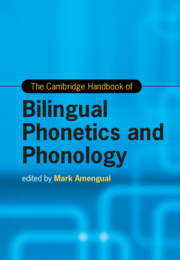Book contents
- The Cambridge Handbook of Bilingual Phonetics and Phonology
- Cambridge Handbooks in Language and Linguistics
- The Cambridge Handbook of Bilingual Phonetics and Phonology
- Copyright page
- Dedication
- Contents
- Figures
- Tables
- Contributors
- Acknowledgments
- Introduction Bilingual Phonetics and Phonology
- Part I Approaches to Bilingual Phonetics and Phonology
- Part II Theoretical Models of Bilingual Phonetics and Phonology
- Part III The Phonetics and Phonology of the Bilingual Child
- Part IV The Phonetics and Phonology of the Bilingual Adult
- 17 The Speech Perception of Bilingual Adults
- 18 The Speech Production of Bilingual Adults
- 19 Phonological Processing and Lexical Encoding in Bilingual Speech
- 20 Acquisition of Segmental Phonology in Adult Bilingualism
- 21 Acquisition of Suprasegmental Phonology in Adult Bilingualism
- Part V The Diversity of Bilingual Speakers
- Part VI Variables and Outcomes of Bilingual Speech
- Index
- References
19 - Phonological Processing and Lexical Encoding in Bilingual Speech
from Part IV - The Phonetics and Phonology of the Bilingual Adult
Published online by Cambridge University Press: 14 November 2024
- The Cambridge Handbook of Bilingual Phonetics and Phonology
- Cambridge Handbooks in Language and Linguistics
- The Cambridge Handbook of Bilingual Phonetics and Phonology
- Copyright page
- Dedication
- Contents
- Figures
- Tables
- Contributors
- Acknowledgments
- Introduction Bilingual Phonetics and Phonology
- Part I Approaches to Bilingual Phonetics and Phonology
- Part II Theoretical Models of Bilingual Phonetics and Phonology
- Part III The Phonetics and Phonology of the Bilingual Child
- Part IV The Phonetics and Phonology of the Bilingual Adult
- 17 The Speech Perception of Bilingual Adults
- 18 The Speech Production of Bilingual Adults
- 19 Phonological Processing and Lexical Encoding in Bilingual Speech
- 20 Acquisition of Segmental Phonology in Adult Bilingualism
- 21 Acquisition of Suprasegmental Phonology in Adult Bilingualism
- Part V The Diversity of Bilingual Speakers
- Part VI Variables and Outcomes of Bilingual Speech
- Index
- References
Summary
Spoken word recognition is an automatic and smooth everyday process for most of us in our first language (L1), but it can be challenging in a second language (L2). Bilinguals’ recognition of spoken L2 words is characterized by L1 interference in how words are phonologically encoded in the mental lexicon, and how they are activated during comprehension. This chapter provides an overview of phonological processing during spoken word recognition in bilinguals, describing how phonological knowledge in L1 impacts the processing of native and non-native speech for various phonological dimensions. The chapter then surveys major experimental findings in L2 phonological perception and lexical access processes, highlighting the connection between the two, and showing that the phonolexical representations created by L2 learners are L1 influenced. This survey is contextualized by an outline of the various “forces” that further shape processing (e.g. orthography, vocabulary size, or lexical factors). Finally, the chapter outlines how L2 phonological processing develops over time, and how learners succeed at optimizing their processing and creating more target-like phonolexical representations.
Keywords
- Type
- Chapter
- Information
- The Cambridge Handbook of Bilingual Phonetics and Phonology , pp. 426 - 447Publisher: Cambridge University PressPrint publication year: 2024

